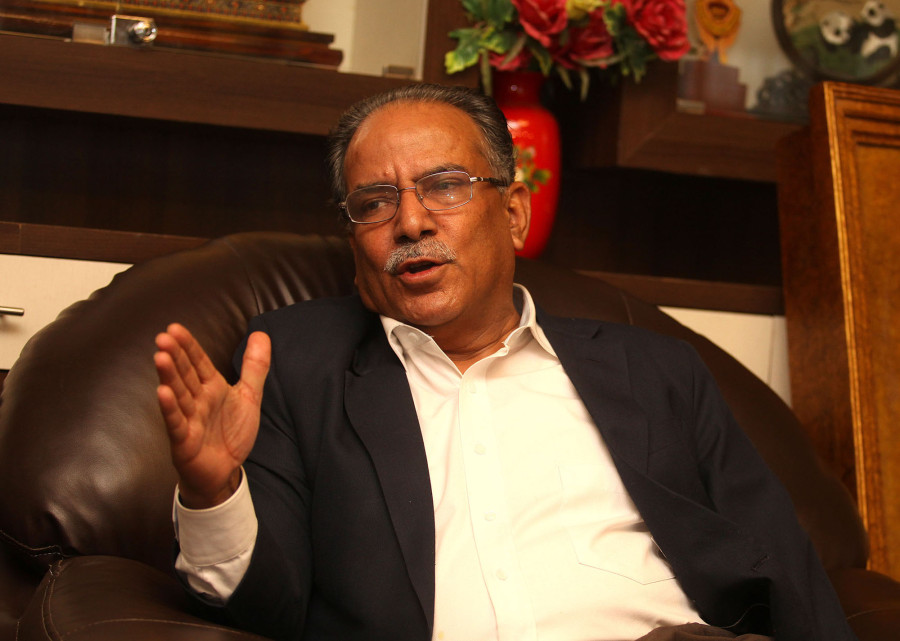National
Dahal says he will take responsibility for insurgency deaths but his actions don’t match his words
Victims say he is delaying the justice process.
Binod Ghimire
For the last few months, Nepal Communist Party Co-chair Pushpa Kamal Dahal has repeatedly insisted that he is committed to transitional justice. Since September, Dahal, who was the supreme commander of the rebel Maoists during the decade-long insurgency, has, on at least three occasions, said that he is ready to take responsibility for all positive and negative implications of the ‘peoples war’.
“As the only living signatory to the peace agreement, I am committed to concluding the transitional justice process as demanded by the victims,” Dahal said on the 13th anniversary of the Comprehensive Peace Agreement, which was signed on November 21, 2006.
On Wednesday, he went a step forward, saying he would take responsibility for 5,000 deaths during the conflict. Addressing the Maghi festival of the Tharu people in the Capital, Dahal said that the state had killed 12,000 of the total 17,000 dead.
But conflict victims and human rights defenders have long stopped buying Dahal’s public statements. In the 13 years since the peace agreement was signed, Dahal hasn’t taken any concrete steps to ensure transitional justice. Victims have long demanded transparency in appointments to the two transitional justice commissions and amendment to the existing transtional justice Act. Instead, Dahal, along with a close coterie of political leaders and the Nepal Army, has worked to slow down the process and politicise it.
“His actions don't match his commitments,” said Suman Adhikari, whose father Muktinath Adhikari, was killed by the Maoists in 2002. “His statements are nothing but mere rhetoric.”
Human rights defenders too say that leaders like Dahal must speak with their actions rather than making commitments with no results.
“Dahal must demonstrate accountability, which is lacking in his actions,” said Satish Mainali, an advocate who has contested cases on behalf of conflict victims.
Human rights activists say that Dahal as co-chair of the ruling party is in a position to play a constructive role in taking the transtional justice process forward.
Nearly five years since the Supreme Court directed the government to revise the Enforced Disappearances Enquiry and Truth and Reconciliation Commission Act-2014 in line with Nepal’s international obligations, successive governments have ignored the ruling to ensure transitional justice. The Commission of Investigation on Enforced Disappeared Persons and the Truth and Reconciliation Commission have both been non-functional and without office bearers since April.
According to human rights activists, all parties, including the one that Dahal leads, are prolonging the process in the hopes that they can tire out the victims.
“It is better for the parties to conclude the process through the domestic system,” said Daman Nath Dhungana, a civil society activist, at a programme organised on Friday to mark 18 years since Muktinath’s killing. “The parties must get rid of the illusion that they can tire out the victims and derail the process. The international community will not give up.”
Despite victims and human rights defenders all entreating the parties to put a stop to the politicisation of the transtional justice process, the parties have continued with their efforts to have ‘their’ people in the two commissions. Leaders from the ruling party and the Nepali Congress, the main opposition party, are in negotiations over new appointments to the two commissions.
Prime Minister KP Sharma Oli, Dahal and Nepali Congress President Sher Bahadur Deuba, along with the second-rung leaders of their parties, discussed legal amendments and appointments on Friday at Baluwatar, according to Khim Lal Devkota, a ruling party leader who was present in the meeting.
The government on January 13 held consultations with the concerned parties to collect feedback on legal amendments. But victims and the human rights community have both criticised the consultations as just a formality.




 14.24°C Kathmandu
14.24°C Kathmandu















